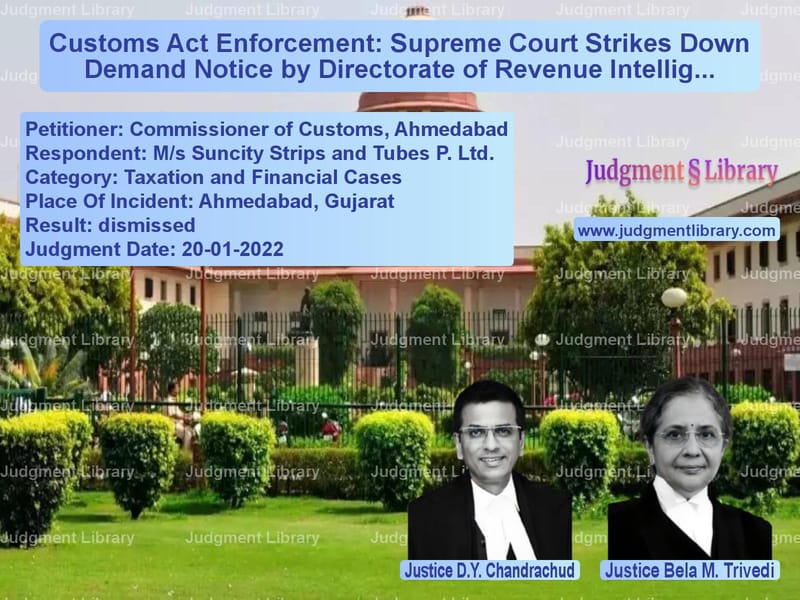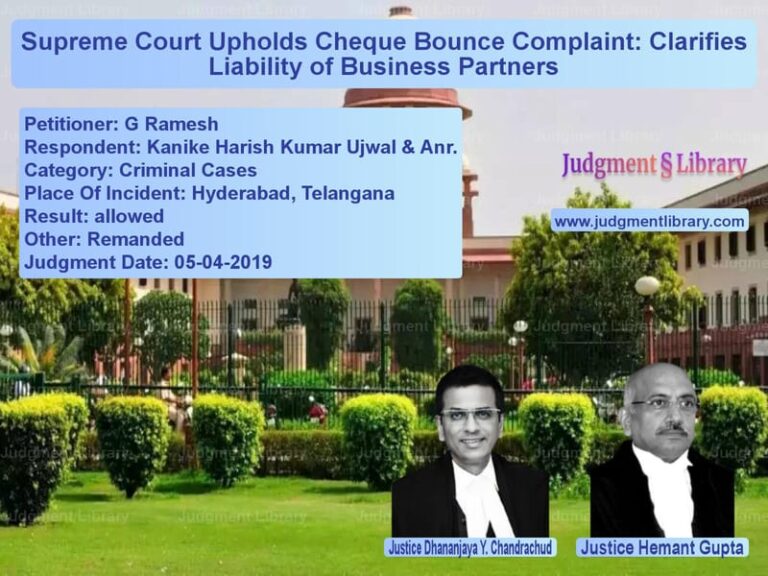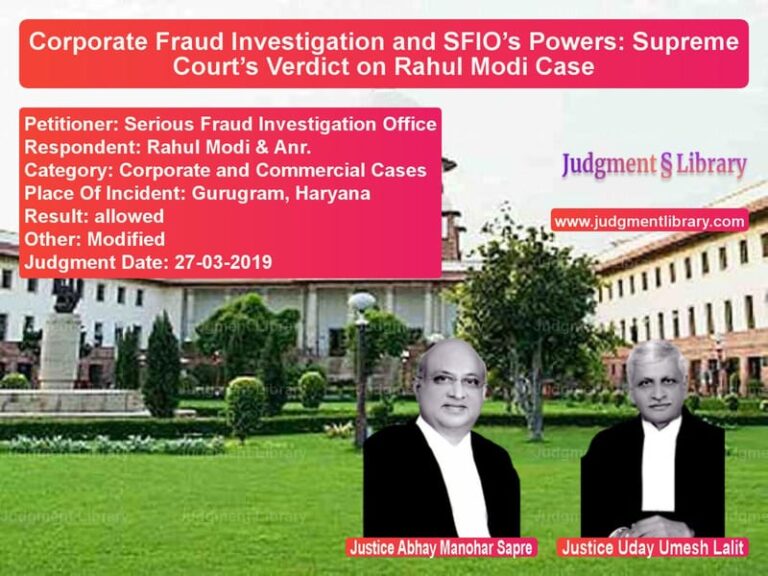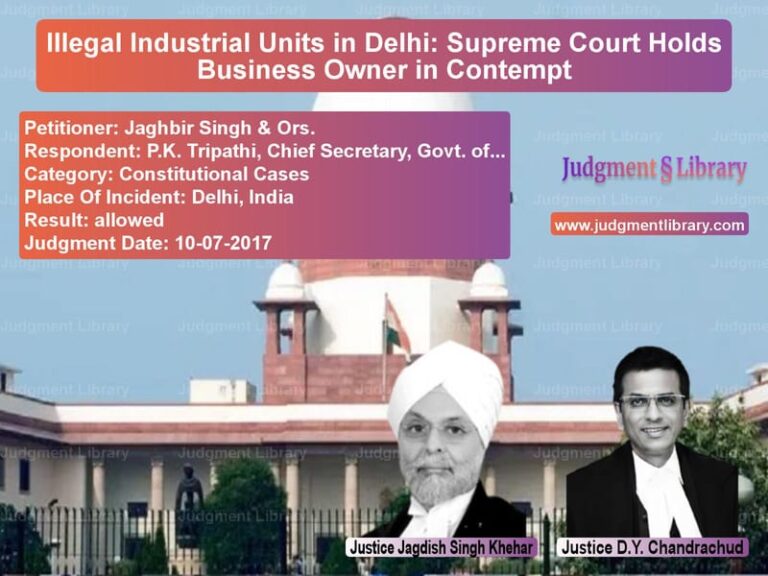Customs Act Enforcement: Supreme Court Strikes Down Demand Notice by Directorate of Revenue Intelligence
The Supreme Court of India recently delivered a significant judgment in the case of Commissioner of Customs, Ahmedabad vs. M/s Suncity Strips and Tubes P. Ltd.. The case revolved around the legality of a show-cause notice issued by the Additional Director General of the Directorate of Revenue Intelligence (DRI), which sought to recover customs duty from the respondent. The Court ruled that such notices, if issued without proper authorization, are invalid under the Customs Act, 1962.
Background of the Case
The dispute arose when the DRI issued a show-cause notice on October 30, 2013, against M/s Suncity Strips and Tubes P. Ltd., raising demands under the Customs Act, 1962. The notice was issued by the Additional Director General, Directorate of Revenue Intelligence, Ahmedabad.
The respondent challenged the notice, contending that the DRI officer did not have the jurisdiction to issue such a notice under the Customs Act, as he was not entrusted with the powers of a customs officer under Section 6 of the Act. The case was heard by the Customs Excise and Service Tax Appellate Tribunal (CESTAT), which ruled in favor of the respondent. The Commissioner of Customs, Ahmedabad, then appealed the decision before the Supreme Court.
Petitioner’s Arguments
The Commissioner of Customs, Ahmedabad, argued that:
- The DRI, as an investigative body, has the authority to issue show-cause notices for customs duty recovery.
- The government had granted sufficient powers to DRI officers to function as customs officers under various notifications.
- The Tribunal’s decision relied on a misinterpretation of the law.
- The show-cause notice was valid and should be enforced.
Respondent’s Arguments
The respondent, M/s Suncity Strips and Tubes P. Ltd., countered that:
- The Additional Director General of the DRI had no legal authority to issue a show-cause notice.
- Under Section 6 of the Customs Act, only an officer entrusted with customs powers can issue such notices.
- The Supreme Court’s earlier ruling in Canon India Private Limited vs. Commissioner of Customs (2021) established that DRI officers cannot assume the role of customs officers unless specifically authorized.
- The notice was illegal and should be quashed.
Supreme Court’s Observations
The Supreme Court, comprising Justice D.Y. Chandrachud and Justice Bela M. Trivedi, examined the legal provisions of the Customs Act, 1962, and the precedent set by the Canon India case. The Court reaffirmed its previous ruling, stating:
“In the absence of an entrustment under Section 6 of the Customs Act, 1962, an officer of the Directorate of Revenue Intelligence will not have jurisdiction to exercise the functions entrusted to Customs Officers under the provisions of the Act.”
The Court concluded that the entire proceeding initiated by the Additional Director General of the DRI was invalid. The show-cause notice lacked legal standing, and any demand raised through it could not be enforced.
Final Judgment
On January 20, 2022, the Supreme Court ruled:
“In view of the decision of the three-Judge Bench in Canon India Private Limited, the appeal which has been filed by the Commissioner of Customs in the present case will have to be and is accordingly dismissed.”
The Court declined to express an opinion on the merits of the CESTAT’s ruling, as the case was dismissed purely on jurisdictional grounds.
Legal Implications of the Judgment
This ruling has far-reaching consequences for tax enforcement and customs law in India:
- Jurisdictional Clarity: The decision reinforces that only properly authorized customs officers can issue show-cause notices under the Customs Act.
- Limitations on DRI’s Role: The ruling curtails the investigative powers of the Directorate of Revenue Intelligence, ensuring that it cannot assume customs enforcement functions without express legal authorization.
- Reliance on Precedents: The Court’s reliance on Canon India reaffirms the importance of consistency in judicial rulings on customs enforcement.
- Impact on Pending Cases: Several pending cases involving show-cause notices issued by the DRI may now be challenged on similar jurisdictional grounds.
Conclusion
The Supreme Court’s decision underscores the importance of adherence to statutory provisions when enforcing customs laws. By dismissing the Commissioner of Customs’ appeal, the Court has set a precedent that ensures only properly empowered officers can issue notices under the Customs Act. This ruling will likely impact future enforcement actions and bring greater clarity to the role of the DRI in tax administration.
Petitioner Name: Commissioner of Customs, Ahmedabad.Respondent Name: M/s Suncity Strips and Tubes P. Ltd..Judgment By: Justice D.Y. Chandrachud, Justice Bela M. Trivedi.Place Of Incident: Ahmedabad, Gujarat.Judgment Date: 20-01-2022.
Don’t miss out on the full details! Download the complete judgment in PDF format below and gain valuable insights instantly!
Download Judgment: commissioner-of-cust-vs-ms-suncity-strips-a-supreme-court-of-india-judgment-dated-20-01-2022.pdf
Directly Download Judgment: Directly download this Judgment
See all petitions in Tax Refund Disputes
See all petitions in Banking Regulations
See all petitions in Customs and Excise
See all petitions in Judgment by Dhananjaya Y Chandrachud
See all petitions in Judgment by Bela M. Trivedi
See all petitions in dismissed
See all petitions in supreme court of India judgments January 2022
See all petitions in 2022 judgments
See all posts in Taxation and Financial Cases Category
See all allowed petitions in Taxation and Financial Cases Category
See all Dismissed petitions in Taxation and Financial Cases Category
See all partially allowed petitions in Taxation and Financial Cases Category







